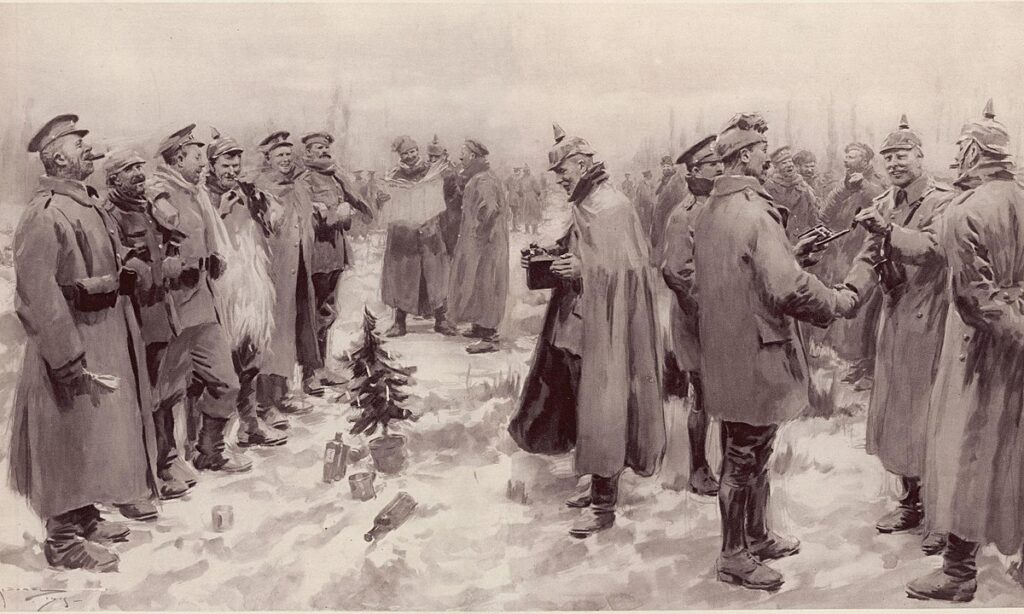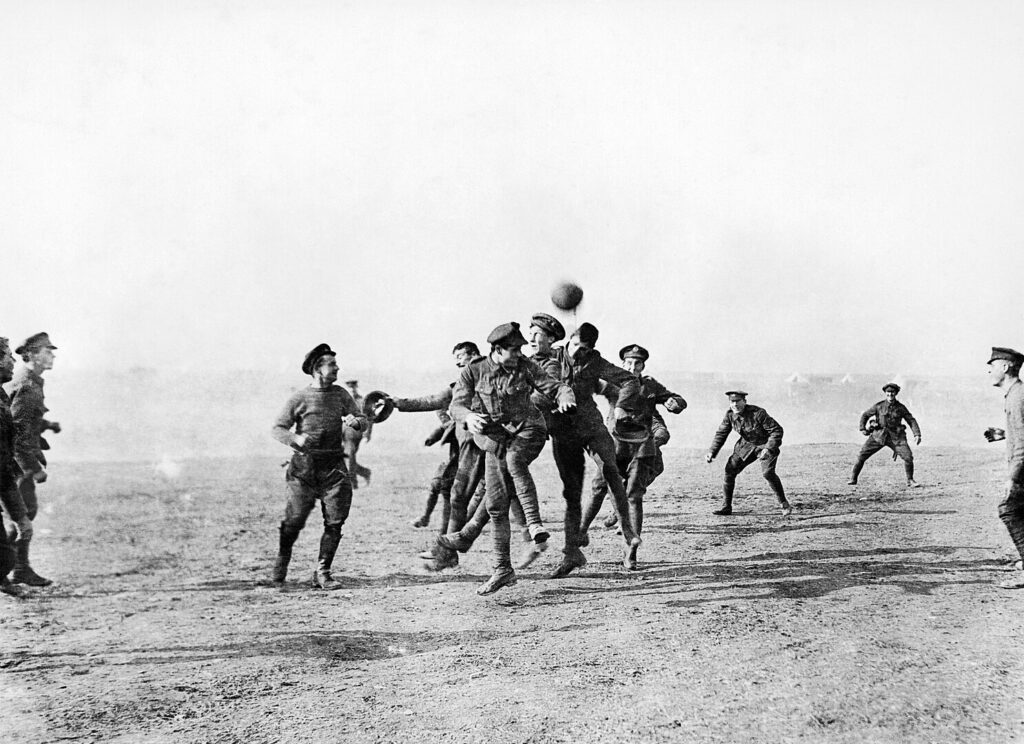In the dim light of dawn, Private James peered over the edge of the trench, his breath visible in the crisp, bitter air. The trench, a narrow, muddy channel, stretched endlessly in both directions. The ground beneath him squelched with each step as he navigated through the clinging mud, his boots heavy and soaked through. The acrid stench of damp earth mixed with the putrid odor of decay, and rats scurried about, unbothered by the war raging above.
The walls of the trench were scarred with the remnants of past battles, and every shadow seemed to conceal unseen dangers. It was a harsh world, where the constant threat of enemy gunfire echoed in the air, and the only safety was found in the tight, makeshift shelters. As James huddled in the trench, the memory of home seemed a distant dream, drowned out by the harsh reality of trench warfare in World War I.

World War I began in 1914 because different countries in Europe had a conflict and couldn’t figure out how to sort things out through negotiations, so tragically they turned to war. The major players were divided into two groups – the Allies, which included countries like Britain and France, and the Central Powers, with Germany and Austria-Hungary.
World War I took place during The Industrial Revolution, a period of massive technological change, which transformed the way things were made and powered. Those changes played a new role in how the war was fought. The Industrial Revolution had ushered in a new era of machinery and innovation. Factories churned out weapons, tanks, and airplanes at a fast pace, powered by steam and later electricity. The introduction of assembly lines made production faster and more efficient. This change, called mechanization altered the nature of warfare, as nations now had access to powerful and technologically advanced weapons. The Industrial Revolution essentially turned the gears of progress, and the impact of this transformation could be seen on the battlefields of World War I, where machines played a significant role in shaping the course of history.
During the war, soldiers on both sides had a horrible job. They fought in trenches, which were long, narrow ditches in the ground. Imagine living in a muddy, wet hole, facing constant rain, and dealing with cold weather. On top of that, there were rats, lice, and the fear of enemy attacks always hanging over their heads.
In the year 1914, during the winter, the holidays were approaching. The soldiers missed their families. They thought of how nice it would be to be home, in a warm home with those they loved. They didn’t want to be fighting and cold and suffering. This was the holidays and Christmas time for them. It was supposed to be a delightful time of year of family, friends, and giving.
On December 24th, Christmas Eve 1914, as the moon shone brightly, a British soldier named James heard the singing coming from the German side. The enemy soldiers were singing Christmas carols. James peaked his head out of the trench and saw candlelights twinkling in the distance.
Soldiers from both sides cautiously stepped out of their trenches, meeting in the space between, called no man’s land. At first, they were cautious, but then they started sharing things. A German soldier named Franz offered James a piece of chocolate – a rare treat in those times.

In No Man’s Land, the tension between enemies faded, and soon, soldiers from both sides were sharing food and exchanging small gifts. One British soldier set up a makeshift barbershop. Someone pulled out a soccer ball and the ground in between was very icy, but both sides started playing the game together, laughing and enjoying this moment of peace. Soon a couple hundred soldiers were playing together.
One officer later wrote:
“How marvelously wonderful, yet how strange it was. The English officers felt the same way about it. Thus Christmas, the celebration of Love, managed to bring mortal enemies together as friends for a time.”
This was a Christmas truce. A truce is an agreement of peace between enemies.
One British soldier, Tommy, wrote in a letter home, “It was a Christmas miracle! We sang, we laughed, and for a brief moment, the war seemed to disappear. We realized that the men on the other side were just like us, missing their families and longing for peace.”
Word of the truce spread, and soon, other soldiers along the Western Front joined in the Christmas celebrations. The spirit of goodwill and humanity triumphed over the hatred and violence of war.
As Christmas morning arrived, the soldiers exchanged more than just gifts. They shared stories of home, pictures of loved ones, and dreams of a future where they could live without fear and anger. For a short time, the war was forgotten, and the soldiers saw each other not as enemies but as fellow human beings.
Private Albert Moren of the British 2nd Queen’s Regiment later wrote, “On Christmas morning, we stuck up a board with ‘A Merry Christmas’ on it. The enemy had stuck up a similar one. Platoons would sometimes go out for twenty-four hours’ rest – it was a day at least out of the trench and relieved the monotony a bit – and my platoon had gone out in this way the night before, but a few of us stayed behind to see what would happen. Two of our men then threw their equipment off and jumped on the parapet with their hands above their heads. Two of the Germans did the same and commenced to walk up the river bank, our two men going to meet them. They met and shook hands and then we all got out of the trench.”
From the German side, Lieutenant Kurt Zehmisch later wrote, “How marvelously wonderful, yet how strange it was. The English officers felt the same way about it. Thus Christmas, the celebration of Love, managed to bring mortal enemies together as friends for a time.”
These accounts offer a glimpse into the unique and unexpected moments of camaraderie and humanity that emerged during the Christmas truce of 1914.
But as the sun set on that magical Christmas day, the soldiers knew they had to return to their trenches to fight. The war would continue for another 4 long years, and the truce would become a memory. Yet, the Christmas truce of 1914 left a lasting mark on those who experienced it.
As the war continued, the soldiers carried the memory of that special Christmas with them. They remembered the warmth of friendship, the joy of shared laughter, and the hope that even in the darkest times, humanity could prevail.
The story of the Christmas truce teaches us that even in the middle of a conflict, there is room for kindness and understanding. It reminds us that, despite our differences, we are all human, with the same hopes and dreams for a better world.
So, as you spend time with your family and friends during the holiday season, think about the Christmas truce of 1914. Consider how a simple act of kindness can bring people together. Is there someone you have had disagreements with but want to be close to again? Or someone you need to forgive? Finding harmony in life isn’t easy but something we should work toward and just like those brave soldiers on the Western Front, let the spirit of peace and goodwill fill your heart.
And who knows, maybe, just maybe, the inspiration from the Christmas truce will encourage a world where kindness triumphs over hatred, and where the spirit of unity prevails, not just during the holidays but every day of the year.
